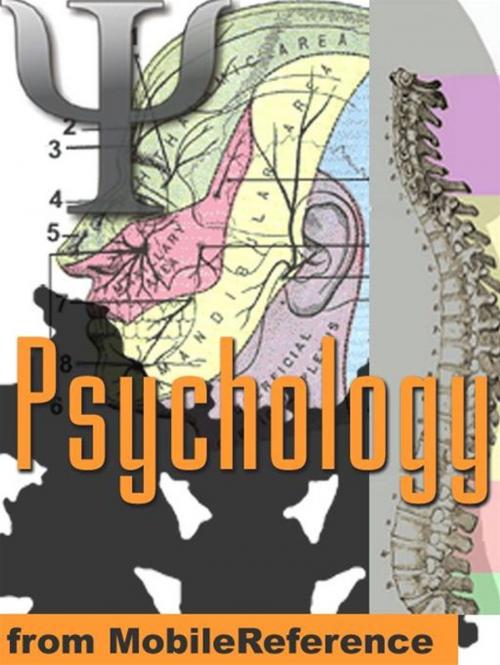Psychology Study Guide: Neuropsychology, Sensory Systems, Perception, Learning And Memory, Thinking, Language, Intelligence, Development, Personality, Mind, Social & Abnormal Psychology, Psychoactive Drugs (Mobi Study Guides)
Nonfiction, Reference & Language, Study Aids, Reference, Health & Well Being, Psychology| Author: | MobileReference | ISBN: | 9781605010694 |
| Publisher: | MobileReference | Publication: | January 1, 2010 |
| Imprint: | MobileReference | Language: | English |
| Author: | MobileReference |
| ISBN: | 9781605010694 |
| Publisher: | MobileReference |
| Publication: | January 1, 2010 |
| Imprint: | MobileReference |
| Language: | English |
Boost Your grades with this fully illustrated Study Guide. You will use it from an undergraduate school all the way to medical school.Audience:Intended for everyone interested in psychology, particularly undergraduate and graduate students, medical students, nursing, and dental students.TABLE OF CONTENTS: I. Introduction II. Neuropsychology III. Sensory Systems IV. Perception V. Learning and Memory VI. Thinking, Language, Intelligence VII. Development VIII. Personality, Mind, and Social Psychology IX. Abnormal Psychology X. Psychoactive Drugs I. IntroductionIntroduction: History Principles Scope Research psychology Applied psychology Research methods CriticismII. NeuropsychologyNeuron: Axon Dendrite Synapse Neurotransmitters Action Potential Postsynaptic PotentialNervous System Organization: Brain Spinal cord Central nervous system Peripheral nervous system Somatic nervous system Autonomic nervous systemBrain Stem: Medulla oblongata Pons MidbrainDiencephalon: Thalamus Hypothalamus Pituitary glandTelencephalon: Brain Gyri and sulci Brodmann area Cerebral cortex Cerebral hemisphere Lateralization of brain function Frontal lobe Occipital lobe Parietal lobe Temporal lobe Corpus callosum FornixLimbic System: Amygdala Cingulate gyrus Fornicate gyrus Hippocampus Hypothalamus Mammillary body Nucleus accumbens Orbitofrontal cortex Parahippocampal gyrusIII. Sensory SystemsVisual system: Eye Lateral geniculate nucleus Optic radiation Visual cortexAuditory system: Outer ear Middle ear Cochlea Medial geniculate nuclei Primary auditory cortexOlfactory system: Olfactory receptor neurons Piriform cortexGustatory system: Tongue Taste bud Basic tastes Primary gustatory areaSomatosensory system: Nociception Thermoreception Vestibular system Mechanoreception Proprioception Golgi organ Muscle spindleIV. PerceptionPerception: Weber-Fechner law Stevens' power law Absolute threshold Just noticeable difference Psychometric function LimenPerceptual Cues: Perceptual constancy Visual perception Depth perception Motion perceptionAttention: Top-down and bottom-up information processing Cocktail party effect Stroop effectV. Learning and MemoryLearning: Habituation Classical conditioning Backward conditioning Second-order conditioning Rescorla-Wagner model Eyeblink conditioning Operant conditioning SensitizationMemory: Short-term memory Long-term memory Working memory Cortical plasticity Hebbian learning Forgetting AmnesiaVI. Thinking, Language, IntelligenceThinking: Abstraction Concept Mental image Animal cognition Problem solving : Algorithm Heuristic Reasoning: Deductive reasoning Inductive reasoning Abductive reasoning AnalogyLanguage: Phoneme Morpheme Syntax Language acquisition Aphasia: Broca's (expressive) aphasia Wernicke's (receptive) aphasiaIntelligence: IQ Stanford-Binet IQ test Raven's Progressive Matrices Wechsler Adult Intelligence ScaleVII. DevelopmentDevelopmental Psychology: Theory History Stages of development Schools of psychology Research methods Theorists & theories...
Boost Your grades with this fully illustrated Study Guide. You will use it from an undergraduate school all the way to medical school.Audience:Intended for everyone interested in psychology, particularly undergraduate and graduate students, medical students, nursing, and dental students.TABLE OF CONTENTS: I. Introduction II. Neuropsychology III. Sensory Systems IV. Perception V. Learning and Memory VI. Thinking, Language, Intelligence VII. Development VIII. Personality, Mind, and Social Psychology IX. Abnormal Psychology X. Psychoactive Drugs I. IntroductionIntroduction: History Principles Scope Research psychology Applied psychology Research methods CriticismII. NeuropsychologyNeuron: Axon Dendrite Synapse Neurotransmitters Action Potential Postsynaptic PotentialNervous System Organization: Brain Spinal cord Central nervous system Peripheral nervous system Somatic nervous system Autonomic nervous systemBrain Stem: Medulla oblongata Pons MidbrainDiencephalon: Thalamus Hypothalamus Pituitary glandTelencephalon: Brain Gyri and sulci Brodmann area Cerebral cortex Cerebral hemisphere Lateralization of brain function Frontal lobe Occipital lobe Parietal lobe Temporal lobe Corpus callosum FornixLimbic System: Amygdala Cingulate gyrus Fornicate gyrus Hippocampus Hypothalamus Mammillary body Nucleus accumbens Orbitofrontal cortex Parahippocampal gyrusIII. Sensory SystemsVisual system: Eye Lateral geniculate nucleus Optic radiation Visual cortexAuditory system: Outer ear Middle ear Cochlea Medial geniculate nuclei Primary auditory cortexOlfactory system: Olfactory receptor neurons Piriform cortexGustatory system: Tongue Taste bud Basic tastes Primary gustatory areaSomatosensory system: Nociception Thermoreception Vestibular system Mechanoreception Proprioception Golgi organ Muscle spindleIV. PerceptionPerception: Weber-Fechner law Stevens' power law Absolute threshold Just noticeable difference Psychometric function LimenPerceptual Cues: Perceptual constancy Visual perception Depth perception Motion perceptionAttention: Top-down and bottom-up information processing Cocktail party effect Stroop effectV. Learning and MemoryLearning: Habituation Classical conditioning Backward conditioning Second-order conditioning Rescorla-Wagner model Eyeblink conditioning Operant conditioning SensitizationMemory: Short-term memory Long-term memory Working memory Cortical plasticity Hebbian learning Forgetting AmnesiaVI. Thinking, Language, IntelligenceThinking: Abstraction Concept Mental image Animal cognition Problem solving : Algorithm Heuristic Reasoning: Deductive reasoning Inductive reasoning Abductive reasoning AnalogyLanguage: Phoneme Morpheme Syntax Language acquisition Aphasia: Broca's (expressive) aphasia Wernicke's (receptive) aphasiaIntelligence: IQ Stanford-Binet IQ test Raven's Progressive Matrices Wechsler Adult Intelligence ScaleVII. DevelopmentDevelopmental Psychology: Theory History Stages of development Schools of psychology Research methods Theorists & theories...















